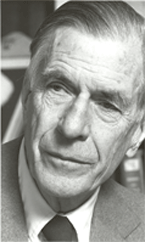2000 Leontief Prize
2000 Leontief Prize
Awarded to Amartya Sen and John Kenneth Galbraith

Amartya Sen
Amartya Sen is the Master of Trinity College in Cambridge, England and Lamont University Professor Emeritus at the Harvard Center for Population and Development Studies. Sen was awarded the 1998 Nobel Memorial Prize in Economics for his contributions to welfare economics. He has merged the insights of economics and philosophy through a combination of rigor and humanitarian concern addressing problems, such as poverty, inequality, freedom, and the meaning of progress.
A casual observer might conclude that it is the philosopher in Sen who has paid such scrupulous attention to the logical use of economic methods; who has insisted that economists must care at least as much about equity as about efficiency; and whose work starts from the questions: What is a good life? How is it achieved?
But these are not only philosophical concerns. When they are ignored, there is a great danger that the field of economics in general, and development economics in particular, will produce policy recommendations that have no aim but GDP growth. There are things in the Gross Domestic Product that do, and things that do not, contribute to human well-being; and there are aspects of well-being that have nothing to do with GDP. Sen cuts across these, identifying, on a logically rigorous, ethically grounded basis, the human concerns that must be central to economics.

John Kenneth Galbraith
John Kenneth Galbraith was a leading 20th century economist and professor at Harvard University. Some of his major works include American Capitalism: The Concept of Countervailing Power, The Affluent Society, The New Industrial State, and The Great Crash, 1929. He delighted and edified the devoted readers of his many and scintillating books by relentlessly describing the world as he so perceptively sees it — sometimes leaving theory to come panting in his wake. He repeatedly warned of the cost to the powerless in society when governments cede too much of their power to market forces. In the early 1950s he recognized what is even more obvious today: that the growing power of giant corporations diminishes the usefulness of economic theories that start from the assumption of perfect competition.
The other side of the coin from Galbraith’s trenchant observations of corporations is his recognition of how consumer behavior and consumer tastes are manipulated to increase demand. This observation, too, has only become more relevant with the passing decades, and has inspired the growing number of people who are concerned about the ways that modern materialist consumption fails to increase human well-being, and threatens the health of the environment. Ken Galbraith strides easily over what others perceive as boundaries between economics and the adjacent social sciences — history, sociology, and political theory.